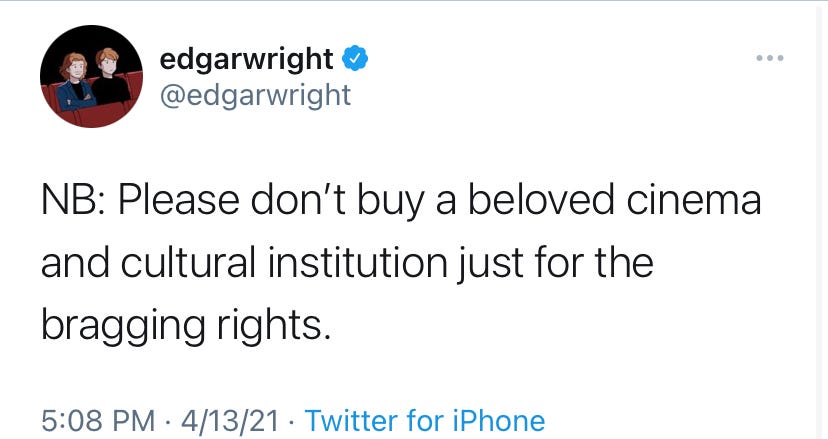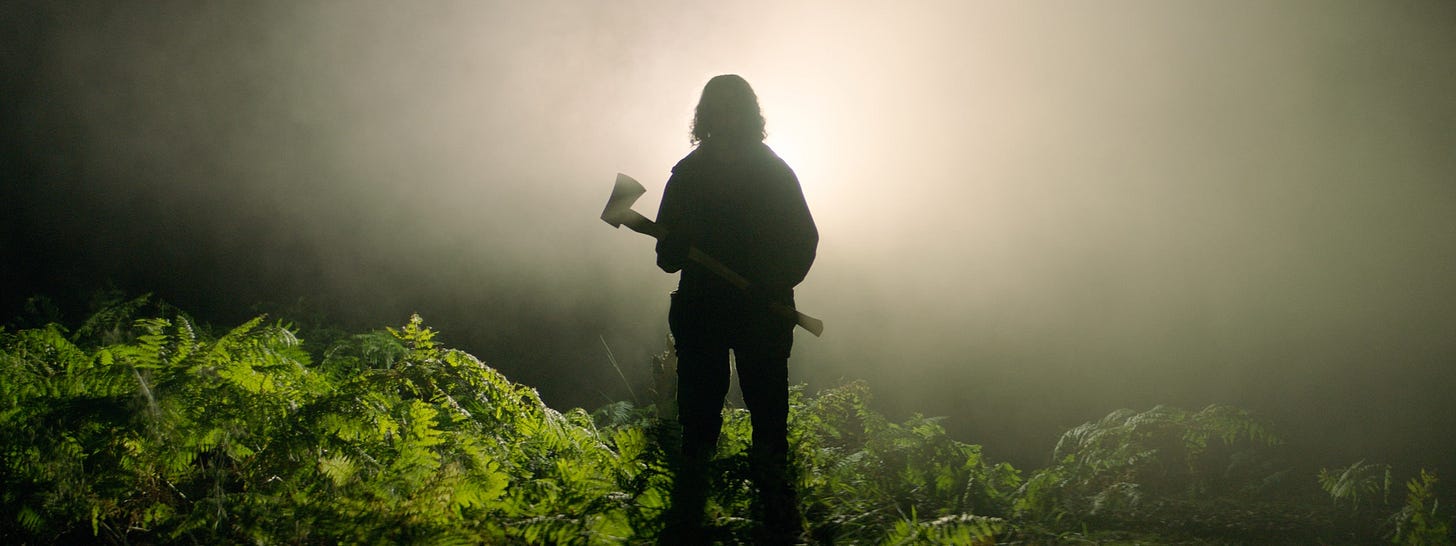Elon Musk Should Buy the Arclight
Plus: ‘In the Earth’ reviewed. Is it the first great pandemic movie?
A programming note: We usually send out Screen Time, this newsletter, on Fridays. Thursdays are reserved for The Bulwark Goes to Hollywood, Sonny’s long-form interview podcast. But this week he has a special guest (Megan Ganz, EP on Mythic Quest and Always Sunny in Philadelphia) talking about a special subject (the new season of Mythic Quest, one of Sonny’s favorite shows), and for scheduling/embargo reasons, that cannot go up until Friday. Hence the flip flop! Apologies in advance. And if you’re reading this newsletter via Twitter or some other means, make sure to sign up for BGTH today at the link above to get the interview in your inbox tomorrow!
Elon Musk Presents: The Tesla Movie Dome
Edgar Wright is absolutely one of my favorite filmmakers working today: witty, stylish, and a good interview. As a result, I’m loath to disagree with him on matters film. But I had to strenuously disagree when he suggested, in a now-deleted tweet, that no one should “buy a beloved cinema and cultural institution just for the bragging rights.”
Wright is referring to the Cinerama Dome in Los Angeles, which is currently owned by the Arclight theater chain. Arclight, sadly, has announced that its theaters are not going to reopen, having suffered too greatly as a result of overzealous government closures, audience resistance to heading back to theaters, and a paucity of new product from the studio pipeline.
Losing the Arclight—a couple hundred screens at eleven theater complexes around the country—is a real blow for movie lovers, as attending a film at the Arclight was always a delightful experience. Sure, it cost a little more. But you had someone introduce the movie you were about to watch! The food options were superior! The picture was always in focus and the sound system was never blown out! They were early adopters of the assigned seating model that now dominates theaters! They closed the doors after the film started to ensure no stragglers wandered in to disrupt your viewing experience!
The Arclight was at the forefront of the premium theatrical experience, showing both mainstream fare and carefully curated indie selections designed to appeal to audiences looking for a little more. I always liked to think of Arclight, Alamo, and Angelika as the Killer A’s.
And now one of the Killer A’s appears to be dead. Another, Alamo is restructuring via bankruptcy; the chain’s branches in my area have yet to reopen. And the Angelika in Dallas is only open on weekends.
It’s a tough time for movie theaters, which is why, contra Wright, I’d be happy to have someone swoop in and save the day. Someone who can use a bit of their star power and their luster to restore the shine to a fading enterprise.
Someone like Elon Musk, master of the attention economy.
Now, look: I understand JVL’s issues with Tesla and Musk. But since this is the way of the future, why not use his surplus Dogecoin to fund a li’l old movie operation? And if it sweetens the deal, he could make the purchase all about how he, Elon Musk, is the savior of the theatrical model. Think about how badly he’d own all of those libs on Film Twitter who’d have to think about the fact that they’re putting money in the pocket of Elon Musk by going to the Arclight. Hell, he could put a giant animatronic statue of himself in the lobby welcoming them to the show.
So please, Elon Musk: Buy the Arclight! Connect each one around the country via Hyperloop! Make tickets purchasable only via Bitcoin. (Don’t do this, actually.)
Help us, Elon-Wan Kenobi! You’re our only hope.
If you like my insane plan to save the Arclight—or want to help save theaters by convincing a dear friend to go see the new scary movie In the Earth, reviewed below—please share this newsletter with them! As Harry Tuttle once said: “We’re all in it together!”
Review: In the Earth (Theaters)
In the Earth may be the first great movie of the pandemic.
I quite enjoyed Songbird, the Michael Bay-produced film about how folks are forced to live in lockdown after COVID mutates and becomes even deadlier. But it’s no one’s idea of a great movie, even if it had some interesting ideas about the nature of power, bureaucracy, and decency in the midst of tragedy. It’s an action thriller set during a time when it’s nearly impossible to film action thrillers; of course it’s going to suffer as a result.
This is a trickier thing to determine, but: Songbird also might end up looking hopelessly dated, just in terms of everything we see up on the screen. The masks and the Zoom-style screens and the overbearing government excess; one assumes—one hopes!—these signifiers will prove as temporary as they may have been necessary.
Some of that is present in In the Earth, writer-director Ben Wheatley’s new pagan horror flick. Martin (Joel Fry) is forced to run a gamut of health screens as he enters a cabin outside a forest in England; an unnamed virus still runs rampant in the cities, where Martin has spent the last four months alone, in his flat, waiting for the sickness to end. He’s accompanied into the woods by ranger Alma (Ellora Torchia), who warns that it’s a two-day hike and hopes he’s been keeping up with his fitness.
Spoiler: He hasn’t been. But that’s the least of his troubles after the pair are attacked in the middle of the night by an unseen enemy. Alma and Martin are bashed in the head and awaken to find that they’ve had their electronics destroyed and their shoes stolen. Odd, but understandable, if you’re looking to keep people in the woods from being able to escape. Fortunately, they find a friendly face in Zach (Reece Shearsmith), who is squatting in the thickets and has an extra set of shoes for each of them.
And that’s all I’ll say about the plot; this is one you’ll want to experience as fresh as possible and with as few expectations and as little foreknowledge as possible. Rooted firmly in the realm of “elevated horror,” that subgenre meant to separate scary movies with artistic airs from mere slasher fare, In the Earth quickly devolves into a terrifying examination of trust and isolation in the wickedness of nature.
A word of warning: There are many strobe effects and a series of quick-cut montages that may be tough to watch if you’re sensitive to that sort of thing. For my part, I hope to see this in a theater at some point in its run, because the sound design—creaking trees and man-made beats alike—felt encompassing while watching at home and wearing a decent set of headphones.
The key idea of In the Earth is the rejection of the notion that the woods are purer or safer in time of crisis than the cities, even cities overwhelmed by disease and distrust. In part that’s because humanity brings its neuroses wherever it goes. But it’s also because we’re constantly trying to impose order upon the world no matter what we find in it.
Two lines from Wheatley’s film jumped out. “Everyone will forget what happened,” Alma says to Martin as they’re discussing the new realities of their world and how quickly everything will revert once some sense of normalcy is restored. It’s an idea with both positive and negative connotations; the ability of the human mind to suppress trauma is one of its greatest strengths, and we’re in the midst of a societywide trauma, and yet the inability to remember a trauma connotes a refusal to grapple with it. Everyone might forget what happened, but if they do, can we prevent it from happening again?
“It’s a psychological problem with humans,” another character muses later. “We want to make stories out of everything.” The textual component of this has to do with the human effort to find patterns in randomness, which, fine. But there’s a metatextual component to this, a sort of pseudo-critique of the very idea of making a movie that is “about” the pandemic, even if it is not really about the pandemic or is only tangentially about the pandemic.
Making stories out of the pandemic isn’t unreasonable, of course. And Wheatley suggests the best way to do it: Keep it on the edges of the story, right around the fringe.
Assigned Viewing: Kill List (Criterion Channel)
I have to say, I don’t really get the whole Ben Wheatley thing; he’s clearly got a good eye, but I generally find his movies a bit confounding. Kill List is probably my favorite of his films, and even that one has an ending that is both mystifyingly obscure in terms of plot development and a bit obvious in the emotional climax it’s working toward.
Still, I think it’s well worth watching and makes a decent pairing with In the Earth, in that it is about the tenuousness of society, the rules we make for ourselves and just kind of, you know, hope that everyone follows. (Spoiler: Not everyone follows the rules. A door isn’t a talisman protecting you from home invasion; it’s just a request that your neighbors leave you alone.)
Plus, this is a great excuse to remind you to subscribe to the Criterion Channel, a good service that will expand the scope of your film-watching. Get it today!






